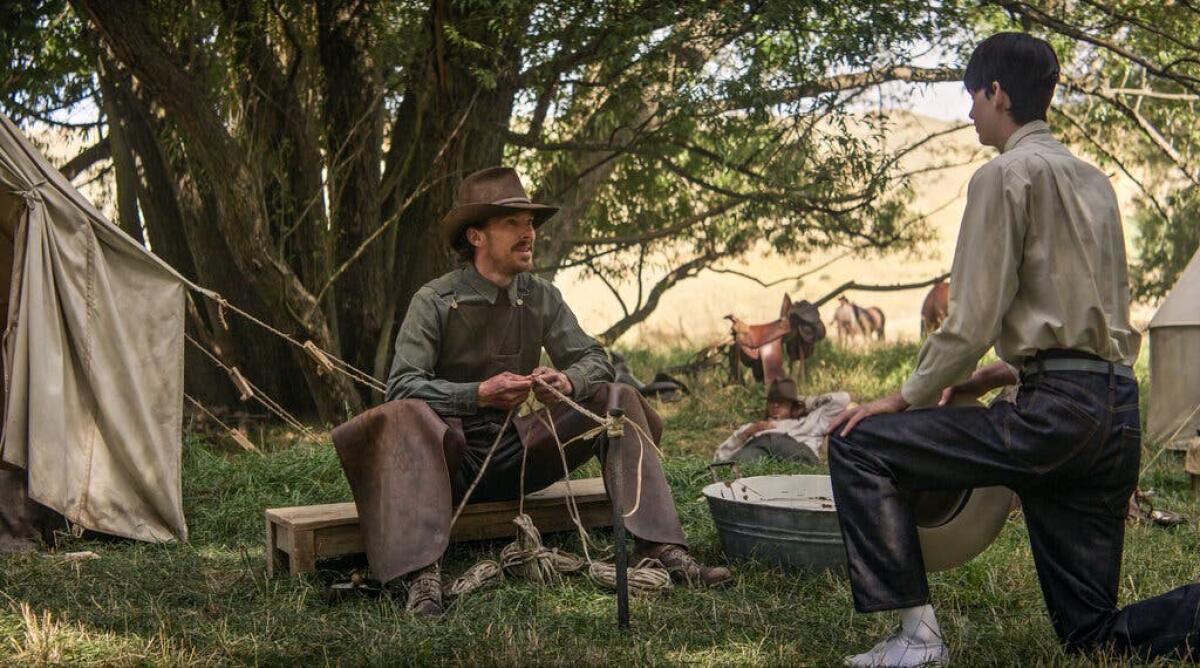Key takeaways from Oscar nominations, as ‘Power of the Dog’ leads the pack

Battered and weary after navigating two years of a punishing pandemic, Hollywood soldiered on with one of its most hallowed traditions Tuesday morning, unveiling nominations for the 94th Academy Awards.
While the movie industry as a whole may not be in the most festive mood these days, academy voters still found plenty worth celebrating from the last year, spreading their love to films and performances across a wide range of genres, with Netflix’s western drama “The Power of the Dog” leading the pack with 12 nominations followed by the sci-fi epic “Dune” with 10.
Both were best picture nominees along with “Belfast,” “CODA,” “Don’t Look Up,” “Drive My Car,” “King Richard,” “Licorice Pizza,” “Nightmare Alley” and “West Side Story.”
In the acting categories, lead actor nominations went to Javier Bardem (“Being the Ricardos”), Benedict Cumberbatch (“The Power of the Dog”), Andrew Garfield (“Tick, Tick … Boom!”), Will Smith (“King Richard”) and Denzel Washington (“The Tragedy of Macbeth”).
A complete guide to where you can watch and/or stream all the movies nominated for this year’s Oscars, from ‘Drive My Car’ to ‘Power of the Dog.’
Lead actress nods went to Jessica Chastain (“The Eyes of Tammy Faye”), Olivia Colman (“The Lost Daughter”), Penélope Cruz (“Parallel Mothers”), Nicole Kidman (“Being the Ricardos”) and Kristen Stewart (“Spencer”). In one of the morning’s surprises, Lady Gaga failed to make the cut for her work in “House of Gucci.”
Jane Campion became the first woman ever to score a second directing nomination for her work in “The Power of the Dog,” with other directing nods going to Paul Thomas Anderson (“Licorice Pizza”), Kenneth Branagh (“Belfast”), Ryûsuke Hamaguchi (“Drive My Car”) and Steven Spielberg (“West Side Story”).
Here are a few key takeaways:
Streaming domination
With movie theaters continuing to struggle to draw audiences for adult-oriented fare and studios recalibrating their release strategies in response, streaming services unsurprisingly dominated this year’s Oscar nominations.
Half of the best picture nominations went to films that either heralded from a streaming service or were released simultaneously in theaters and via streaming, showing the continued inexorable shift in viewing habits for awards fare away from theaters and toward the living room.
Lady Gaga is out and Kristen Stewart is in for the 2022 Oscars. Here are other major inclusions and omissions.
For the third year in a row, Netflix — which is still in the hunt for its first best picture Oscar win — led the field with 27 nominations, fueled by “The Power of the Dog” and “Don’t Look Up.” Apple Original Films scored its first best picture nod for “CODA,” which the company acquired at last year’s Sundance Film Festival for a record-setting $25 million.
Still, traditional distributors showed they remain very much in the fight, with the Academy of Motion Picture Arts and Sciences showing favor to Walt Disney Co. releases including “West Side Story” and “Nightmare Alley” as well as Focus Features’ “Belfast” and MGM/United Artist Releasing’s “Licorice Pizza.” Warner Bros.’ “Dune” and “King Richard” split the difference as major theatrical releases that were simultaneously released on HBO Max.
Vanishing blockbusters
Two years ago — which to many in Hollywood feels like a lifetime ago — five of 2020’s best picture nominees crossed the $100-million mark at the domestic box office. This year, only one managed to clear that benchmark. “Dune” just barely made it, grossing $107 million domestically. Despite starry casts and A-list-directors, Spielberg’s “West Side Story” has pulled in just $35 million and Guillermo del Toro’s noir “Nightmare Alley” has made only $10 million.
Marvel fans who may have hoped to see the year’s biggest box office smash by far, “Spider-Man: No Way Home,” pull in a best picture nomination came away disappointed, with the film scoring just a single nod for visual effects. While the massive box office haul of “Spider-Man” — three-quarters of a billion dollars domestically and counting — has given the industry a much-needed morale boost, academy voters apparently felt the film didn’t have the artistic heft or historical import of the two previous comic-book films that managed to score best picture nods, “Black Panther” and “Joker.”
For a film academy that has seen ratings for the Oscars steadily dwindle over the last two decades, reaching an all-time low of 10.4 million viewers last year, the lack of widely seen box office hits may portend more trouble for this year’s telecast, scheduled for March 27. But academy leaders can at least console themselves with the fact that plenty of people have watched some of this year’s best picture nominees from the comfort of their couches. While streaming services tend to keep their viewership figures to themselves, Netflix revealed last month that “Don’t Look Up” set a record for the platform with more than 152 million hours watched in its first week.
A mixed bag for smaller films
If this year’s theatrical environment has been tough for even splashy, star-studded Oscar bait, it’s been downright brutal for art-house fare. Without the benefit of the usual packed awards-season circuit of cocktail parties, screenings and Q&As, some smaller, more idiosyncratic awards hopefuls that have stuck to traditional theatrical releases have struggled to generate sustained enthusiasm.
Despite earning raves at last fall’s Telluride Film Festival, for example, A24’s “C’Mon C’Mon” and “Red Rocket” came up empty-handed. Apple TV+ and A24’s “The Tragedy of Macbeth,” which some had considered a contender for best picture, failed to make the cut, though the film did earn three nods, including a lead actor nod for Washington.
The nominations for the 2022 Academy Awards were announced early Tuesday. Here is the full list of nominees in all 23 categories.
Still, the news wasn’t all grim for independent films, with a few smaller specialty releases managing to squeeze into the best picture race. Most notably: Sideshow and Janus Films’ drama “Drive My Car,” based on a short story by Haruki Murakami, made a surprisingly strong showing with four nominations, including best picture and director. If a quiet three-hour Japanese-language film dealing with themes of regret and loss can still grab Oscar voters’ attention to this degree, perhaps there is still life in the art house after all.
Inclusion scorecard
Six years after the #OscarsSoWhite firestorm, diversity continues to be a major focus both for the film academy, which has dramatically expanded and diversified its membership, and for armchair Oscar observers. On that score, this year represented something of a step backward after last year’s watershed nominations, even as some noteworthy milestones were achieved.
In last year’s awards, driven by films such as “Minari” and “Judas and the Black Messiah,” a record nine of the 20 nominations in the acting categories went to people of color. This year, only four did, including Smith, who earned his first acting nomination since 2007, and supporting actress nominees Aunjanue Ellis (“King Richard”) and Ariana DeBose (“West Side Story.”) With his recognition for “The Tragedy of Macbeth,” Washington notched his 10th career Oscar nomination.
All five lead actress nominations went to white performers after Screen Actors Guild award nominee Jennifer Hudson failed to score a nod for her role as Aretha Franklin in “Respect.”
For his work in “CODA,” Troy Kotsur became only the second deaf actor ever to receive an Oscar nomination, joining Marlee Matlin, who plays his wife in the film and who made history 35 years ago with her 1987 lead actress win for “Children of a Lesser God.”
In addition to Campion’s milestone directing nod, “Power of the Dog” cinematographer Ari Wegner became only the second woman ever nominated in the cinematography category, while “Encanto” composer Germaine Franco became only the third woman in the last 20 years to be nominated for original score. And with their nominations, LGBTQ actors Stewart and DeBose represented another step forward for inclusion.
Bringing in the fans
While the job of announcing Oscar nominations is typically reserved for Hollywood notables, this year the academy reached outside of the industry to include a number of people from different walks of life in the action.
In Tampa, pro wrestling star Titus O’Neil joined eighth-grader Kourtney Anderson to present the nominees for animated feature. In Detroit, physician assistant Chantia Bobo Harden, surrounded by other healthcare workers, read the nominees for original score. In New York, a group of New York City firefighters did the honors for the visual effects category. And in Washington, D.C., students at the Chadwick A. Boseman College of Fine Arts at Howard University read the nominations for lead actor.
At a moment of deep existential anxiety for both the academy and the film industry as a whole, the message couldn’t be clearer: For all the challenges they face in this ever-shifting entertainment landscape, movies — and not just the ones with characters wearing spandex — still matter to a lot of people outside the bounds of Hollywood.
Now if only some of those fans will actually tune in to the Oscars.
More to Read
The biggest entertainment stories
Get our big stories about Hollywood, film, television, music, arts, culture and more right in your inbox as soon as they publish.
You may occasionally receive promotional content from the Los Angeles Times.










